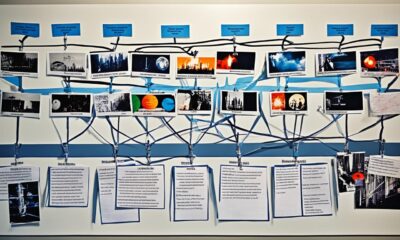Covert Narcissist
Overt vs. Covert Narcissist: Key Distinctions

Were you aware that up to 6.2% of the adult population in the United States is affected by narcissistic personality disorder? This astonishing figure underscores the widespread nature and influence of narcissism within our community. However, among these individuals, there exist two unique kinds of narcissists who demonstrate varying behaviors and traits: overt and covert narcissists.
While both overt and covert narcissists share a lack of empathy and a sense of entitlement, their approaches to manipulation and control differ significantly. Overt narcissists tend to be grandiose, attention-seeking, and have an inflated ego, while covert narcissists are more subtle, using tactics like deception and manipulation to maintain control and appear humble.
In this article, we will delve into the key distinctions between overt and covert narcissists, their characteristic behaviors, the origins of covert narcissism, and its impact on relationships. We will also provide strategies for coping with a covert narcissist in your life, ensuring your emotional well-being remains intact.
Key Takeaways:
- Overt and covert narcissists exhibit different behaviors and characteristics.
- Overt narcissists are grandiose and attention-seeking, while covert narcissists are more subtle and manipulative.
- Childhood trauma, genetics, and brain chemistry contribute to the development of covert narcissism.
- Recognizing the signs of covert narcissism is crucial for protecting yourself from emotional abuse.
- Setting boundaries and seeking professional help can aid in coping with a covert narcissist.
Defining Covert Narcissism
Covert narcissism is a subtype of narcissistic personality disorder characterized by a grandiose sense of self-importance and entitlement. However, unlike their overt counterparts, covert narcissists often appear shy, humble, or introverted. Despite their outward persona, they engage in manipulation, deception, and a need for control.
Covert narcissists possess a constant need for validation and attention from others, which they relentlessly seek to fulfill through various manipulative tactics. Their ability to deceive and manipulate makes it challenging for them to form genuine and meaningful relationships, as they view others as mere objects to be controlled and utilized for personal gain.
It is important to understand the traits of narcissism and recognize narcissistic behavior to protect oneself from emotional manipulation and abuse. By identifying the signs of covert narcissism, individuals can gain a deeper understanding of this complex personality disorder and its impact on relationships.
| Key Traits of a Covert Narcissist |
|---|
| Emotional manipulation |
| Passive-aggressive behavior |
| Lack of empathy and emotional coldness |
| Constant need for validation and attention |
Covert narcissists employ emotional manipulation, using guilt-tripping and gaslighting as tools to control and demean their victims. Their passive-aggressive behavior allows them to maintain a façade of innocence while subtly undermining others. The absence of empathy and emotional coldness makes it challenging for them to genuinely connect with individuals on an emotional level. Moreover, their insatiable craving for validation and attention fuels their manipulative behaviors and keeps them engaged in a perpetual cycle of control and validation-seeking.
Understanding the traits of a covert narcissist is crucial in navigating relationships and protecting oneself from the adverse effects of their manipulation. By recognizing covert narcissism and setting boundaries, individuals can safeguard their emotional well-being and foster healthier connections. Seeking professional help from a mental health professional or support group can provide invaluable guidance and support throughout the healing process.
Spotting Covert Narcissism
Identifying covert narcissism can be challenging as individuals adeptly conceal their true nature beneath a mask of kindness and attentiveness. However, there are key behaviors to watch out for:
- Emotional manipulation
- Passive-aggressive behavior
- Lack of empathy
- Constant need for validation
- Gaslighting
- Jealousy and controlling behavior in relationships
By paying attention to these signs, individuals can gain the insight needed to identify covert narcissism and protect themselves from emotional abuse.
The Difference Between Overt and Covert Narcissism
Overt narcissism and covert narcissism are two distinct subtypes of narcissistic personality disorder. While they both share similar traits, there are key differences in their behavior and presentation.
Overt narcissism is characterized by grandiosity, attention-seeking, and an inflated sense of self-importance. These individuals are often outwardly confident and charismatic, seeking validation and admiration from others. They have an overwhelming need for attention and will go to great lengths to be the center of attention.
On the other hand, covert narcissism is more subtle and focused on maintaining control over others. Covert narcissists often appear humble, shy, or introverted, concealing their true narcissistic nature. They use manipulation and deception to achieve their goals, operating in a covert and secretive manner.
Despite their different approaches, both overt and covert narcissists lack empathy and display a sense of entitlement. They believe they are superior to others and have a right to special treatment.
Table: A Comparison of Overt and Covert Narcissism
| Overt Narcissism | Covert Narcissism |
|---|---|
| Grandiose, attention-seeking behavior | Humble, introverted appearance |
| Outwardly confident and charismatic | Conceals true narcissistic nature |
| Seeks constant validation and admiration | Manipulates covertly to achieve goals |
| Lacks empathy | Displays a false sense of empathy |
| Prone to grandiose delusions | Struggles with feelings of shame |
It is important to note that while overt narcissists may be more overtly grandiose and attention-seeking, covert narcissists may struggle with feelings of shame and wear a false mask of humility. Both types can be equally harmful and destructive in relationships.

The Origins of Covert Narcissism
Covert narcissism, like other forms of narcissistic personality disorder, can often be traced back to childhood experiences and environmental factors. Specifically, childhood trauma, such as neglect, emotional abuse, or abandonment, can play a significant role in the development of covert narcissism.
Children who grow up in environments where their emotional needs are not met may develop maladaptive coping mechanisms as a means to survive and thrive. These coping mechanisms often involve manipulation and engaging in deceptive behaviors to meet their needs. Covert narcissists may utilize these manipulative tactics to obtain the validation, attention, and control they seek.
Additionally, there may be a genetic and neurological component to the development of covert narcissism. Studies have suggested that certain genetic predispositions and brain chemistry imbalances may contribute to the manifestation of narcissistic personality disorder.
It is important to note that while childhood trauma and genetic factors can be contributing factors, each individual’s journey and development of covert narcissism may vary. Understanding the origins of covert narcissism provides insight into the complexities of this personality disorder and highlights the importance of addressing childhood trauma and seeking therapeutic interventions for healing and personal growth.
Internalized Childhood Trauma and Covert Narcissism
“Covert narcissism often stems from unresolved childhood trauma. The individual internalizes the emotional neglect, abuse, or abandonment they experienced, leading to the development of manipulative behaviors and a need for control.”
Internalized childhood trauma can shape an individual’s sense of self and impact their psychological development. Those who have undergone emotional neglect, abuse, or abandonment may grow up with deep-seated insecurities and a distorted self-image. Covert narcissists may develop manipulative behaviors and a need for control as a means to protect themselves from further harm and rejection.
Impact of Childhood Environment on Covert Narcissism
“The environment in which a child grows up can contribute to the development of covert narcissism. A lack of emotional support and validation can pave the way for manipulative behaviors and a distorted self-perception.”
A nurturing and supportive childhood environment plays a vital role in fostering healthy emotional development. Children who receive consistent emotional support, validation, and love are more likely to develop secure attachment styles and a healthy sense of self. However, in environments where emotional needs are unfulfilled, children may resort to manipulative tactics to acquire the attention and validation they crave.
Psychological Impact of Covert Narcissism on Self-Identity
“Covert narcissism can deeply affect an individual’s self-identity, leading to feelings of unworthiness, emptiness, and a constant need for external validation.”
Covert narcissism often masks deep-rooted feelings of insecurity and emptiness. Behind the false humility and manipulation lies a fragile self-esteem and an insatiable hunger for validation. Covert narcissists rely heavily on external sources to validate their self-worth, as they struggle to develop a genuine and solid sense of self-identity.
“Building a strong sense of self-worth and addressing unresolved childhood traumas are crucial steps in recovering from covert narcissism.”
Recovering from covert narcissism requires a multifaceted approach that encompasses therapy, self-reflection, and personal growth. By working through past trauma, developing healthy coping mechanisms, and nurturing a positive self-image, individuals can overcome covert narcissism and cultivate authentic connections and relationships.
Key Traits of a Covert Narcissist
Covert narcissists possess a specific set of characteristics that distinguish them from other individuals. These traits, often concealed beneath a facade of humility, can have a profound impact on relationships and interactions with others. Understanding these key traits is essential in identifying and dealing with covert narcissism.
“Covert narcissists are experts at emotional manipulation and passive-aggressive behavior.”
Emotional Manipulation
One of the most prominent traits of a covert narcissist is their adeptness at emotional manipulation. They skillfully exploit the emotions of others with calculated intent, manipulating situations to their advantage. Covert narcissists use tactics such as guilt-tripping and gaslighting to control and dominate those around them.
Passive-Aggressive Behavior
Covert narcissists often display a pattern of passive-aggressive behavior. Instead of openly expressing their negative feelings or opinions, they resort to subtle and indirect actions. This behavior allows them to maintain control while avoiding direct confrontation. Passive-aggressive tactics may include sarcasm, silent treatment, or withholding affection and attention.
Lack of Empathy and Emotional Coldness
Another key trait of covert narcissism is a lack of empathy and emotional coldness. Covert narcissists struggle to understand and connect with the emotions of others. They are often detached and indifferent, prioritizing their own needs and desires over the well-being of those around them.
Constant Need for Validation and Attention
Covert narcissists have an insatiable need for validation and attention. They require constant reassurance and admiration from others to fuel their fragile self-esteem. This need for external validation drives their manipulative behavior and can lead to the manipulation of others’ emotions and actions.
To summarize, covert narcissists exhibit a range of distinct traits, including emotional manipulation, passive-aggressive behavior, a lack of empathy and emotional coldness, and a constant need for validation and attention. Understanding these characteristics can empower individuals to recognize covert narcissism in their relationships and take appropriate action.
Recognizing the Signs of Covert Narcissism
Identifying covert narcissism can be challenging, as individuals with this personality disorder often conceal their true nature behind a facade of kindness and attentiveness. However, there are specific behaviors that can serve as warning signs:
- Emotional manipulation: Covert narcissists are adept at manipulating the emotions of others to meet their own needs. They may use guilt, pity, or sympathy to gain control or elicit a desired response.
- Passive-aggressive behavior: Covert narcissists may express aggression indirectly, often through subtle jabs, sarcasm, or withholding affection. Their behavior is designed to assert control while maintaining a facade of innocence.
- Lack of empathy: One of the hallmark traits of covert narcissism is a profound lack of empathy. Covert narcissists struggle to understand or genuinely care about the emotions and needs of others.
- Constant need for validation: Individuals with covert narcissism have an insatiable need for external validation and attention. They seek approval and admiration to bolster their fragile sense of self-worth.
In addition to these behaviors, covert narcissists may employ gaslighting tactics to manipulate others’ perception of reality. Gaslighting involves distorting or denying the truth to make the victim doubt their own sanity or memory.
It’s important to note that these signs may not manifest in every individual with covert narcissism, and the severity of these behaviors can vary. However, recognizing these patterns can help in identifying and protecting oneself from the manipulative tactics of a covert narcissist.
The Impact of Covert Narcissism on Relationships
Covert narcissism can have a profound impact on relationships, including romantic, familial, and professional relationships. When involved with a covert narcissist, individuals often experience manipulation, control, and emotional abuse, leading to a cycle of narcissistic abuse.
In romantic relationships, covert narcissists may exhibit excessive jealousy, possessiveness, and a constant need for control. They may use tactics such as gaslighting and guilt-tripping to manipulate and undermine their partners. This behavior can erode trust, create tension, and ultimately lead to the deterioration of the relationship.
Within the family dynamic, covert narcissists may exert control over their family members and manipulate situations to serve their own needs. Their lack of empathy and constant need for attention can cause rifts in family relationships and create an unhealthy dynamic where the needs and feelings of others are disregarded.
“Covert narcissists thrive on power and control. Their manipulation tactics can cause significant emotional and psychological harm to their loved ones.”
In the workplace, covert narcissists may engage in office politics, undermine colleagues, and seek to dominate and control workplace dynamics. Their manipulative behavior and constant need for validation may create a toxic work environment, affecting productivity and professional relationships.
Dealing with a covert narcissist in any type of relationship can be challenging and emotionally draining. It is important to recognize the signs of covert narcissism and take steps to protect oneself from narcissistic abuse.
Signs of Overt Narcissism vs. Covert Narcissism:
- Overt narcissists are more grandiose, seeking attention and admiration, while covert narcissists may appear humble and introverted.
- Overt narcissists may exhibit their narcissistic traits openly, while covert narcissists mask their behavior behind a false sense of humility.
- Overt narcissists are more outwardly aggressive and confrontational, while covert narcissists may be passive-aggressive and manipulative in their approach.
Recognizing these signs can help individuals protect themselves and establish healthy boundaries in relationships.
| Effects of Covert Narcissism on Relationships | Examples |
|---|---|
| Manipulative behavior | Gaslighting, guilt-tripping |
| Emotional abuse | Constant criticism, belittling |
| Lack of empathy | Inability to recognize and understand other’s emotions |
| Control and possessiveness | Excessive jealousy, controlling behavior |
| Undermining relationships | Creating tension and rifts in friendships and family dynamics |
It is crucial for individuals affected by covert narcissism to seek support from mental health professionals or support groups to navigate the challenges of dealing with a covert narcissist in their lives. Taking care of one’s own well-being, setting boundaries, and surrounding oneself with a strong support system can contribute to healing and maintaining healthier relationships.
Coping with a Covert Narcissist in Your Life
If you have identified a covert narcissist in your life, it is essential to develop strategies to protect yourself and effectively cope with their manipulative behavior. Coping with a covert narcissist requires setting firm boundaries, seeking professional help when needed, and prioritizing your own well-being.
Setting Boundaries
Setting boundaries is crucial when dealing with a covert narcissist. Establish clear and consistent limits on how they can treat you and what behavior you will not tolerate. Communicate your boundaries assertively and enforce them consistently.
“Setting boundaries is an act of self-respect.”
By setting boundaries, you protect your emotional and mental well-being from manipulation and control. Examples of boundaries you can set include:
- Avoiding engaging in manipulative conversations or arguments
- Refusing to tolerate disrespectful or abusive treatment
- Limiting contact or distancing yourself from the narcissist if necessary
- Setting boundaries on how much personal information you share with them
- Establishing limits on their involvement in your life and decisions
Seeking Professional Help
Dealing with a covert narcissist can be challenging, and seeking support from a mental health professional or joining a support group can provide guidance and validation. A therapist can help you understand the dynamics of your relationship with the narcissist and develop healthy coping strategies.
“Seeking professional help can empower you to navigate the complexities of a covert narcissistic relationship.”
A mental health professional can also assist in rebuilding your self-esteem and developing assertiveness skills to counter the manipulative tactics employed by the covert narcissist.
Self-Care and Support System
When coping with a covert narcissist, it is essential to prioritize your own self-care and surround yourself with a strong support system. Engage in activities that bring you joy, practice self-compassion, and prioritize your physical and emotional well-being.
“Self-care is not selfish; it is necessary for your well-being.”
Build a network of trusted friends and family who can provide emotional support and guidance. Sharing your experiences with others who understand narcissistic behavior can help validate your feelings and empower you to make healthier choices.
Remember, dealing with a covert narcissist can be emotionally draining, but with the right strategies in place, you can protect yourself and assert your own well-being.
Conclusion
In conclusion, understanding narcissistic personality disorder, specifically the differences between overt and covert forms of narcissism, is crucial for navigating relationships and protecting oneself from emotional abuse. Regardless of their presentation, both types of narcissism share core characteristics such as a lack of empathy and a sense of entitlement.
Recognizing the signs of covert narcissism is essential in identifying potential abuse patterns. Emotional manipulation, passive-aggressive behavior, and a constant need for validation and attention are key red flags to watch out for. Seeking professional help and support can pave the way for healing and the development of healthier relationships.
When dealing with a covert narcissist, setting boundaries is paramount. Prioritizing self-care and surrounding oneself with a supportive network can provide the strength and resilience needed to navigate the challenges posed by narcissistic abuse. Through education and empowerment, individuals can break free from the cycle of manipulation and create lives grounded in self-worth and authenticity.FAQ
What are the key distinctions between overt and covert narcissists?
How can I define covert narcissism?
What is the difference between overt and covert narcissism?
What can be the origins of covert narcissism?
What are the key traits of a covert narcissist?
How can I recognize the signs of covert narcissism?
How does covert narcissism impact relationships?
How can I cope with a covert narcissist in my life?
What is the conclusion regarding covert narcissism?
As our Lead Writer, Mia has a talent for turning complex ideas into compelling narratives. With a rich background in writing and a deep passion for psychology, Mia’s articles provide insightful, accessible explorations of narcissistic behavior and its impact on individuals and relationships. Mia’s contributions are thought-provoking and offer practical advice for our readers.
Covert Narcissist
What Makes a Covert Narcissist Different from an Avoidant?
Analyze the intricate behaviors of a covert narcissist or avoidant individual, unraveling the fine line between self-absorption and emotional distance.

The saying ‘actions speak louder than words’ is particularly relevant when differentiating between a covert narcissist and someone with avoidant tendencies within the realm of character traits. The specific behaviors exhibited by individuals with these personality types often cause uncertainty regarding their true motivations and intricate emotions.
As we navigate through the intricate web of characteristics and relational patterns associated with these traits, a deeper understanding of the driving forces behind each persona unveils a fascinating journey into the complexities of human behavior.
Key Takeaways
- Covert narcissists manipulate through gaslighting, lack empathy, and have fragile self-esteem.
- Avoidant individuals fear rejection, struggle with intimacy, and have difficulty expressing emotions.
- Differentiate between covert narcissists and avoidant individuals to navigate relationships effectively.
- Setting boundaries and practicing self-care are crucial in managing interactions with these individuals.
Understanding Covert Narcissistic Behaviors
In understanding covert narcissistic behaviors, it's crucial to recognize the subtle manipulation tactics employed by individuals who exhibit this personality trait. Covert narcissists often display an avoidant attachment style characterized by a strong need for admiration and a lack of empathy towards others. This attachment style stems from underlying feelings of inadequacy and a fragile self-esteem, leading them to seek validation through controlling and manipulating others.
Individuals with covert narcissism may use tactics such as gaslighting, where they distort reality to make their victims doubt their own perceptions and memories. By eroding their victim's sense of reality, covert narcissists gain power and control over them. This manipulation is a key feature of their narcissistic behavior, allowing them to maintain a facade of superiority and self-importance.
Understanding the interplay between avoidant attachment styles and narcissism is crucial in identifying and dealing with covert narcissistic behaviors. By recognizing these subtle manipulation tactics, individuals can better protect themselves from falling victim to the harmful effects of covert narcissists.
Signs of Avoidant Personality Traits

Having understood the manipulation tactics of covert narcissists, it's imperative to recognize the signs of avoidant personality traits that often accompany such behaviors. Avoidant individuals may exhibit the following characteristics:
- Avoidance of intimacy and emotional closeness in relationships.
- Fear of rejection and low self-esteem leading to social withdrawal.
- Difficulty expressing emotions and reluctance to seek help or support.
- Preferring solitary activities and avoiding social interactions.
These traits can stem from various factors, including childhood attachment patterns. Individuals with avoidant attachment styles may struggle with forming secure emotional connections due to past experiences. This can lead to a tendency to withdraw from relationships to protect themselves from perceived rejection or vulnerability.
Understanding these signs can help differentiate between covert narcissistic behaviors and avoidant personality traits, shedding light on the complexities of interpersonal dynamics. Furthermore, recognizing these patterns can aid in addressing underlying issues and fostering healthier relationships.
Impact on Relationships
The impact of avoidant personality traits on relationships can manifest in various ways, affecting both individuals involved. Avoidant individuals often struggle with forming secure attachments, which can lead to challenges in establishing and maintaining healthy adult relationships. Let's delve into the specific impacts on relationships through the table below:
| Impact on Relationships | Description |
|---|---|
| Difficulty with Intimacy | Avoidants may have difficulty opening up emotionally, leading to a lack of intimacy in relationships. |
| Fear of Rejection | Due to their fear of rejection, avoidant individuals may push partners away or avoid commitment altogether. |
| Communication Issues | Avoidants often struggle with effective communication, leading to misunderstandings and conflicts in relationships. |
Understanding these impacts is crucial in navigating relationships with individuals exhibiting avoidant traits. It's important to differentiate between avoidant behaviors and narcissistic personality disorder, as the underlying motivations and dynamics in relationships can vary significantly.
Differentiating Covert Narcissists and Avoidant Individuals

Upon examining the distinct characteristics of covert narcissists and avoidant individuals in relationships, it becomes evident that their behaviors and underlying motivations diverge significantly. When differentiating between covert narcissists and avoidant individuals, several key points emerge:
- Covert narcissists excel at masking their true intentions, seeking admiration and control, while avoidant individuals are more inclined to shun intimacy due to fear of rejection.
- Covert narcissists often employ false humility to garner trust and sympathy, whereas avoidant individuals may struggle with self-esteem and play down their accomplishments.
- Covert narcissists actively seek attention and manipulate situations to be the center of focus, while avoidant individuals prefer to evade attention and remain in the background.
- Covert narcissism is characterized by an unquenchable thirst for admiration and a tendency towards manipulation, whereas avoidant individuals harbor a deep-rooted dread of rejection and encounter difficulties in establishing intimate connections.
Understanding these distinctions can aid in recognizing and navigating relationships with individuals who exhibit traits of either covert narcissism or avoidance.
Coping Strategies and Setting Boundaries
To effectively navigate relationships with individuals displaying traits of covert narcissism or avoidance, implementing and maintaining clear boundaries is essential. When dealing with covert narcissists or avoidant individuals, establishing boundaries helps protect against manipulation and emotional harm.
It's crucial to clearly communicate your limits and expectations to maintain a healthy dynamic. Additionally, practicing coping strategies such as self-care, assertiveness, and seeking support from trusted individuals like friends, family, or therapists can aid in managing interactions with these personality types.
Prioritizing self-care activities that bring joy and fulfillment can help in maintaining emotional well-being. Learning to assertively express needs and feelings without fear of manipulation is key in setting boundaries with covert narcissists or avoidant individuals.
Limiting contact with these individuals when possible can also safeguard emotional health and reinforce boundaries. By incorporating these coping strategies and setting clear boundaries, one can navigate relationships with covert narcissists or avoidant individuals more effectively.
Frequently Asked Questions
Am I Avoidant or Narcissist?
We often question our behavior and tendencies, wondering if we fall into certain psychological categories. It's natural to reflect on our actions and personalities, seeking to understand ourselves better.
Identifying whether we exhibit avoidant or narcissistic traits can provide insight into our emotional patterns and relationships. Self-awareness is a key step in personal growth and development, allowing us to address areas where we may need to make positive changes.
What Can Be Mistaken for Covert Narcissism?
When examining behaviors that can be confused with covert narcissism, it's crucial to consider traits like introversion, shyness, or social anxiety. These characteristics may manifest similarly to covert narcissistic tendencies, such as avoiding social interactions or seeking validation through subtle means.
Understanding the nuances between these traits is essential in accurately identifying covert narcissism and differentiating it from other personality traits or disorders.
What Are the Red Flags of a Covert Narcissist?
When assessing potential red flags of covert narcissism, observing patterns of behavior is crucial. Look for signs of manipulation, lack of empathy, grandiosity, and a constant need for admiration.
Pay attention to how they interact with others, especially in social settings or when faced with criticism. Keep an eye out for subtle but persistent displays of entitlement and a tendency to exploit others for personal gain.
These behaviors can indicate underlying narcissistic traits.
What Hurts a Covert Narcissist the Most?
Criticism or rejection can deeply wound individuals who seek external validation, control, and admiration.
Failure to manipulate or threats to their grandiose fantasies can also trigger intense hurt.
Such individuals may struggle with feelings of inferiority, invisibility, and a fragile self-image.
Understanding these vulnerabilities can shed light on what truly affects them at their core.
Is the Behavior of a Covert Narcissist Related to Their Constant Illness?
The covert narcissist’s constant sickness may be a manipulation tactic to garner sympathy and attention. By portraying themselves as perpetually unwell, they seek to control others’ perceptions and elicit constant care and attention. This behavior aligns with their need for admiration and validation, perpetuating their narcissistic traits.
Conclusion
In conclusion, navigating relationships with individuals exhibiting covert narcissistic behaviors or avoidant attachment can be challenging. It's like walking a tightrope, balancing between their need for validation and fear of intimacy.
Setting boundaries and practicing self-care are crucial in maintaining healthy interactions with these personality types. Remember, understanding their underlying motivations can help in managing expectations and protecting your emotional well-being.
Chris brings a wealth of knowledge and personal experience to the role of Expert Author. With a focus on narcissistic personality disorder and recovery processes, Chris’s articles offer a mix of expert analysis, personal anecdotes, and actionable advice. Their work enriches our platform with depth, authenticity, and a perspective that resonates with those who have experienced narcissism firsthand.
Covert Narcissist
Unveiling the Covert Narcissist’s Final Discard Tactics
Beware the covert narcissist's final discard – uncover the unsettling aftermath and psychological implications that linger long after.

It might be surprising, but studies show that nearly 20% of individuals could encounter a covert narcissist during their lifetime.
The covert narcissist's final discard is a complex and often painful experience that can leave lasting emotional scars. Understanding the intricacies of this behavior can offer insight into the manipulation and psychological impact it can have on those involved.
Exploring the warning signs and aftermath of such a discard can shed light on the dynamics at play and provide a path to healing and recovery.
Key Takeaways
- Gradual withdrawal and manipulation are warning signs of covert narcissist discard.
- Emotional devastation and questioning of reality are common after covert narcissist discard.
- Focus on self-care, therapy, and setting boundaries for coping after covert narcissist discard.
- Seek professional help and surround yourself with a supportive network for healing from covert narcissist abandonment.
Warning Signs of Covert Narcissist Discard
During the discard phase, covert narcissists often gradually withdraw, decrease communication, and engage in subtle manipulative behaviors to undermine the victim's confidence.
Signs of a subtle covert narcissist discard can include setting unclear boundaries, invading personal space, and withholding emotional support.
As the fragile self-esteem of the victim becomes apparent, the covert narcissist may use manipulation tactics such as deflecting blame onto the victim. They may leave you feeling isolated and confused as the narcissist decides when to provide affection and when to withdraw it.
It's essential to recognize these warning signs early on to protect oneself from further emotional harm. By establishing and enforcing personal boundaries, individuals can begin to mitigate the damaging effects of a covert narcissist's discard phase.
Understanding these manipulation tactics is crucial in breaking free from the cycle of emotional abuse perpetuated by covert narcissists.
Emotional Impact of Final Discard

The emotional aftermath of being finally discarded by a covert narcissist can be overwhelmingly devastating, leaving individuals shattered and questioning their self-worth.
Covert narcissists wield power and control in relationships, manipulating emotions to serve their needs.
The discard phase is emotionally draining, as the partner realizes they were merely an object of attention that can be easily cast aside. This act of abandonment can shatter established boundaries, leaving the individual feeling used and disposable.
The covert narcissist's ability to manipulate your emotions can leave you feeling emotionally unstable and questioning your own reality.
The impact of narcissistic abuse can be profound, requiring extensive healing to regain a sense of self-worth and rebuild damaged self-esteem.
The final discard serves as a harsh awakening to the true nature of the covert narcissist, revealing the depth of manipulation and emotional turmoil endured throughout the relationship.
Coping Strategies After Narcissist's Discard
Navigating the aftermath of a covert narcissist's final discard involves implementing essential coping strategies to facilitate healing and reclaiming one's sense of self-worth. After experiencing a narcissist's discard, it's crucial to focus on self-care and prioritize well-being. Seeking therapy or counseling can help process emotions and heal from the trauma. Building a supportive network of friends and family who understand and validate your experiences is essential. Setting boundaries to protect oneself from further manipulation or abuse is key. Additionally, practicing self-compassion and reminding oneself that the discard wasn't their fault can aid in the healing process.
- Acknowledge that the narcissist's behavior is a result of their personality disorder, not your fault.
- Engage in self-reflection to recognize any contribution to the dysfunctional relationship.
- Consider the discard as an opportunity to heal and move on, rather than wanting the narcissist back.
- Implement no contact with the narcissist to aid in the healing process, despite potential hoovering attempts.
- Respond to the discard phase with self-respect, dignity, and a focus on your own well-being.
Recognizing Manipulation Before Discard

When detecting manipulation before a discard by a covert narcissist, it's crucial to pay close attention to subtle behavioral shifts and communication patterns. Recognizing the signs of emotional withdrawal, decreased communication, and the withholding of emotional support and affection can be key indicators of manipulation during the discard phase.
Covert narcissists often display a lack of empathy and employ manipulative tactics, such as undermining confidence through criticism and selective memory. It's important to be aware of the narcissistic cycle of abuse, which typically includes idealization, devaluation, and ultimately, discard.
Additionally, being attuned to dismissive responses, avoidance of sensitive topics, passive-aggressiveness, and attempts to isolate you from loved ones can help in identifying manipulation tactics.
Trusting your instincts and acknowledging the possibility of a devastating final discard can prepare you for the challenging dynamics of a relationship with a covert narcissist. Stay vigilant for inconsistencies in behavior, emotional coldness, and manipulative charm as warning signs of impending discard.
Healing From Covert Narcissist's Abandonment
Understanding the psychological impact of covert narcissist's abandonment is crucial for initiating the healing process and reclaiming one's sense of self-worth. When healing from covert narcissist's abandonment, it's essential to:
- Acknowledge the deep emotional wounds inflicted by the final discard.
- Recognize the insidious tactics covert narcissists use to manipulate and control.
- Seek professional help if needed to navigate the complex emotions and trauma.
- Establish boundaries to protect yourself from further harm.
- Surround yourself with a supportive network of friends, family, or therapists who can provide empathy and guidance.
Healing from covert narcissist's abandonment involves unraveling the web of manipulation and rebuilding your self-esteem. By understanding the dynamics of the relationship with a covert narcissist and taking proactive steps towards healing, you can emerge stronger and more resilient.
Frequently Asked Questions
Do Narcissists Come Back After Final Discard?
Yes, narcissists can come back after the final discard. Their return may stem from a desire to regain control or seek a new source of narcissistic supply. Setting boundaries and focusing on healing are crucial post-discard.
No contact can aid in this process, though the narcissist may try to hoover the victim back in. It's essential to prioritize self-care and recognize that the narcissist's behavior is a result of their disorder, not the victim's actions.
Does a Covert Narcissist Permanently Discard?
Yes, covert narcissists often permanently discard their partners once their needs are no longer met. This final discard can be emotionally devastating, revealing the narcissist's true nature.
The lack of closure can leave partners grappling for answers, leading to trauma and the need for recovery. Covert narcissists employ dismissive tactics, criticism, and manipulation to maintain control, ultimately causing harm before abruptly losing interest.
When a Narcissist Finally Discards You?
When a narcissist finally discards you, it can be a profoundly painful experience. The sudden end of a relationship can leave us feeling lost and hurt.
It's crucial to remember that our worth isn't defined by their actions. Seeking support and therapy can help us navigate the emotional aftermath and rebuild our sense of self.
What Happens to a Covert Narcissist in the End?
In the end, covert narcissists often struggle to maintain lasting relationships due to their inability to form genuine connections. They may continue seeking narcissistic supply from new sources, perpetuating a cycle of emotional devastation.
Their dismissive behavior, insincere responses, and avoidance of sensitive topics can be damaging. Additionally, their undermining of confidence through subtle criticism and manipulation tactics can erode self-esteem.
This pattern of behavior can lead to trauma and the need for narcissistic abuse recovery.
What are the Final Discard Tactics of a Covert Narcissist Compared to those of someone with BPD?
When it comes to bpd vs covert narcissist differences, the final discard tactics can vary. Covert narcissists may silently withdraw and leave without explanation, while individuals with BPD may have emotional outbursts and then cut off contact abruptly. Both can be painful and confusing for the person on the receiving end.
Conclusion
In conclusion, the final discard by a covert narcissist is akin to an emotional earthquake, leaving behind a trail of devastation and heartache.
The impact of this abandonment can be profound, requiring a journey of healing and self-discovery.
It serves as a stark reminder of the insidious nature of narcissistic abuse and the importance of recognizing manipulation before it's too late.
It's a painful but necessary step towards reclaiming one's sense of self-worth and rebuilding a life free from toxic relationships.
Covert Narcissist
What Role Do Covert Narcissists Assign to Flying Monkeys?
Yearning for insights on covert narcissist flying monkeys' sinister tactics? Unravel the hidden dynamics and learn how to shield yourself from their harmful influence.

As we navigate the intricate web of connections woven throughout our lives, we may encounter a unique situation that reflects a timeless tale.
Imagine a scenario where seemingly innocent bystanders transform into enablers of toxic behavior, carrying out the bidding of a hidden puppeteer.
These covert narcissist flying monkeys operate in the shadows, perpetuating manipulation and deceit with unsettling ease.
But what drives these individuals to become willing accomplices, and how can one shield themselves from their harmful influence?
The answers lie in unraveling the intricate dynamics of this psychological dance and empowering oneself to stand firm against their insidious tactics.
Key Takeaways
- Covert narcissists use flying monkeys to spread lies and maintain control.
- Recognizing signs of being a flying monkey is crucial to breaking free.
- Narcissistic abuse impacts relationships, mental health, and social circles.
- Combat manipulation by understanding tactics, setting boundaries, and seeking support.
Understanding the Covert Narcissist's Tactics
When analyzing the tactics of covert narcissists, it becomes evident that their manipulative strategies are often subtle yet profoundly impactful. Understanding these tactics is crucial in combating narcissistic abuse.
Covert narcissists excel at using flying monkeys to spread lies and perpetuate a smear campaign against their victims. These enablers, often unknowingly manipulated by the covert narcissist, serve as conduits for the abuser's toxic behavior, further isolating the victim from support systems.
One of the key tactics of covert narcissists is their ability to charm and manipulate others into believing their false narratives. By presenting a facade of kindness and humility, they mask their true intentions and maintain control over their victims. This facade makes it challenging for outsiders to recognize the abuse taking place, allowing the narcissist to continue their harmful behavior unchecked.
In order to combat the tactics of covert narcissists, it's essential to educate oneself on the signs of narcissistic abuse and cultivate a support network that understands the complexities of dealing with such manipulative individuals. By shining a light on the covert narcissist's tactics, victims can begin to break free from the cycle of abuse and reclaim their autonomy.
Recognizing the Role of Flying Monkeys

Recognizing the role of flying monkeys in covert narcissistic dynamics sheds light on the intricate web of manipulation and toxicity that surrounds the victim. Flying monkeys play a critical role in the covert narcissist's schemes, acting as enablers and instruments of chaos. These individuals, whether knowingly or unwittingly, aid the narcissist in spreading falsehoods and tarnishing the victim's reputation. They're often drawn in due to their own vulnerabilities, such as narcissistic tendencies, a penchant for drama, or a history of trauma that makes them susceptible to manipulation.
Flying monkeys serve as the narcissist's pawns, executing their bidding to isolate the victim from support systems and loved ones. Recognizing the signs of being a flying monkey or identifying them in others is crucial in breaking free from this harmful dynamic. Traits like a lack of boundaries, difficulty in saying no, and a pattern of enabling toxic behavior can indicate a person's potential role as a flying monkey.
Impact on Relationships and Social Circles
The presence of flying monkeys in covert narcissistic dynamics can profoundly disrupt and damage relationships and social circles. When these individuals are manipulated by the narcissist to do their bidding, the repercussions are far-reaching and impactful.
Here are five key ways in which the involvement of flying monkeys can affect relationships and social circles:
- Erosion of Trust: Flying monkeys sow seeds of doubt and mistrust among friends and family, leading to fractured relationships and a breakdown in communication.
- Isolation: By aligning with the narcissist, flying monkeys may isolate the victim, cutting them off from sources of support and exacerbating feelings of loneliness.
- Gaslighting: Flying monkeys may engage in gaslighting tactics, causing confusion and self-doubt in the victim, further destabilizing their mental well-being.
- Social Alienation: The presence of flying monkeys can lead to social alienation, as the victim may be ostracized or excluded from social circles under the influence of the narcissist.
- Mental Health Impacts: The constant manipulation and gaslighting by both the narcissist and their flying monkeys can have severe impacts on the victim's mental health, leading to anxiety, depression, and low self-esteem.
Strategies to Combat Manipulation

The detrimental impact of covert narcissists' flying monkeys on relationships and social circles underscores the necessity for individuals to employ strategic measures to combat manipulation tactics effectively.
Understanding manipulation tactics commonly used by narcissists, such as gaslighting and guilt-tripping, is crucial to recognizing and defending against their influence.
Setting clear boundaries with manipulators and their flying monkeys is essential, clearly communicating what behaviors are unacceptable.
Building a supportive network of trusted individuals who can offer emotional validation and guidance is invaluable in navigating manipulation and gaslighting.
Keeping a record of manipulative behaviors can serve as evidence if legal protection or confrontation becomes necessary.
Seeking professional help from therapists specializing in narcissistic abuse can aid in processing the emotional impacts of manipulation and developing healthy coping mechanisms.
Prioritizing self-care activities and nurturing self-esteem are vital in fortifying oneself against being manipulated.
Healing From Narcissistic Abuse
Understanding the tactics and manipulation techniques employed by narcissists and their flying monkeys is crucial for individuals seeking to heal from narcissistic abuse. To effectively navigate the healing process, it's essential to:
- Build a strong support system: Surround yourself with trusted friends and family who know and support the real you, providing a safe space for healing.
- Seek professional help: Therapy can assist in coping with the emotional and psychological impacts of narcissistic abuse, aiding in the journey towards recovery.
- Document evidence: Keeping a record of interactions with flying monkeys and the narcissist can serve as validation and support in your healing journey.
- Set boundaries: Establish clear boundaries and distance yourself from toxic individuals to prevent further harm and promote self-preservation.
- Identify and break free: Recognize the traits of flying monkeys, such as strong narcissistic tendencies or codependency, to determine whether you're caught in their web and take steps towards liberation.
Frequently Asked Questions
What Drives a Covert Narcissist Crazy?
When a covert narcissist is pushed to the brink, several triggers can set them off. Ignoring their need for attention, challenging their sense of superiority, exposing their true self, setting boundaries, or refusing to be manipulated can all drive them crazy.
These actions threaten their fragile self-image, control, and illusion of grandeur, leading to frustration and anger. Understanding these triggers can help navigate interactions with covert narcissists more effectively.
What Happens if a Narcissist Cannot Control the Victim Anymore Despite Sending Flying Monkeys Also?
When a narcissist loses control over a victim despite deploying flying monkeys, they may resort to heightened manipulation tactics. This can involve increased smear campaigns, harassment, or even threats.
The victim's resilience and seeking support can lead to empowerment, frustrating the narcissist. The victim's refusal to submit may cause the narcissist to escalate their efforts.
Ultimately, the victim's strength and determination can break the narcissist's hold.
What Happens When You Go No Contact With a Covert Narcissist?
When we go no contact with a covert narcissist, we take a crucial step towards reclaiming our autonomy and well-being. This decision disrupts the toxic dynamic, allowing us to break free from manipulation and regain control of our lives.
It can be a challenging journey, marked by emotional upheaval and self-discovery, but ultimately leads to healing, self-empowerment, and the opportunity to cultivate healthier relationships.
Setting boundaries and seeking support are essential during this transformative process.
What Weird Things Do Covert Narcissists Do?
Weird things covert narcissists do include:
- Engaging in subtle manipulation
- Playing the victim to gain sympathy
- Gaslighting to distort reality
- Using passive-aggressive behavior to undermine others
- Playing mind games to keep victims off balance
These tactics create a toxic environment where victims constantly doubt themselves and feel controlled.
It's essential to recognize these behaviors and set boundaries to protect oneself from the psychological harm caused by covert narcissists.
How Do Covert Narcissists Use Flying Monkeys to Manipulate Others?
Covert narcissists often utilize flying monkeys to manipulate others, making it crucial to recognize covert narcissist red flags. These enablers or allies unknowingly do the narcissist’s bidding, spreading misinformation or launching smear campaigns. By understanding covert narcissist red flags, individuals can protect themselves from falling victim to their tactics.
Conclusion
In conclusion, navigating the web of covert narcissist flying monkeys can feel like trying to untangle a knot of thorns.
It's crucial to arm ourselves with knowledge, set firm boundaries, and seek support from trusted allies.
By recognizing their manipulative tactics and standing strong against their abuse, we can begin the healing process and reclaim our power from these toxic influences.
Remember, we aren't alone in this battle against manipulation and control.
Chris brings a wealth of knowledge and personal experience to the role of Expert Author. With a focus on narcissistic personality disorder and recovery processes, Chris’s articles offer a mix of expert analysis, personal anecdotes, and actionable advice. Their work enriches our platform with depth, authenticity, and a perspective that resonates with those who have experienced narcissism firsthand.
-

 How To Deal with Narcissism2 weeks ago
How To Deal with Narcissism2 weeks agoNarcissist Return Timeline: Factors & Predictions
-

 Covert Narcissist1 week ago
Covert Narcissist1 week agoThe Final Covert Narcissist Discard: Signs to Watch For
-

 Divorcing a Narcissist3 months ago
Divorcing a Narcissist3 months agoHealing Together: Support Groups for Narcissistic Abuse Survivors
-

 Covert Narcissist3 months ago
Covert Narcissist3 months ago10 Celebrities Who Display Covert Narcissist Behavior
-

 Narcissistic Cheating Patterns3 months ago
Narcissistic Cheating Patterns3 months agoUnveiling Habits: Cheating Narcissist at Home Post-Affair
-

 How To Deal with Narcissism4 weeks ago
How To Deal with Narcissism4 weeks agoOutsmarting a Narcissist in Court: Strategies to Beat Them
-

 Covert Narcissist1 week ago
Covert Narcissist1 week agoWhat Are the Signs of Covert Narcissist Stalking?
-

 How To Deal with Narcissism4 weeks ago
How To Deal with Narcissism4 weeks agoHow to Make a Narcissist Want You Sexually: A Step-by-Step Guide



















